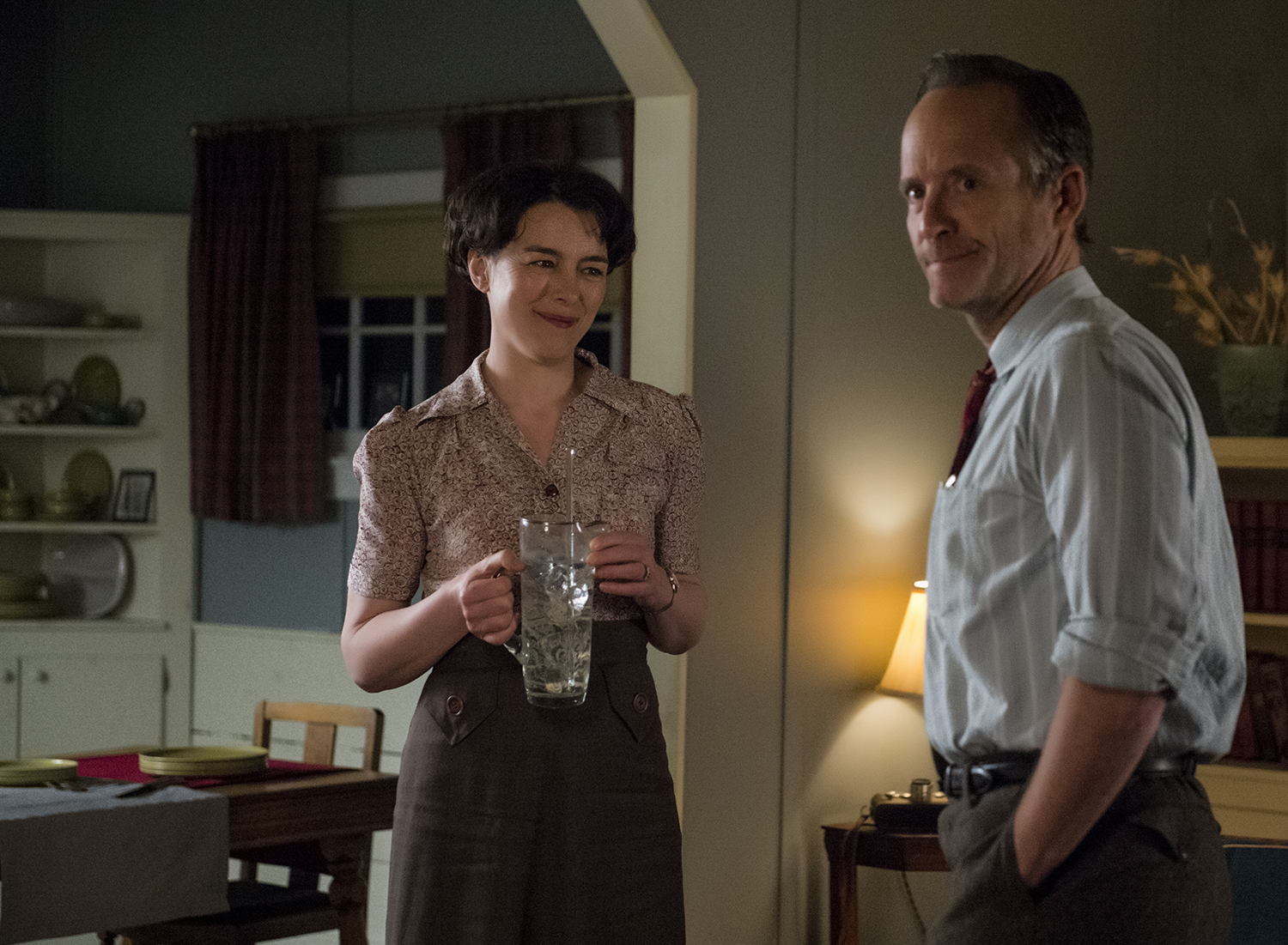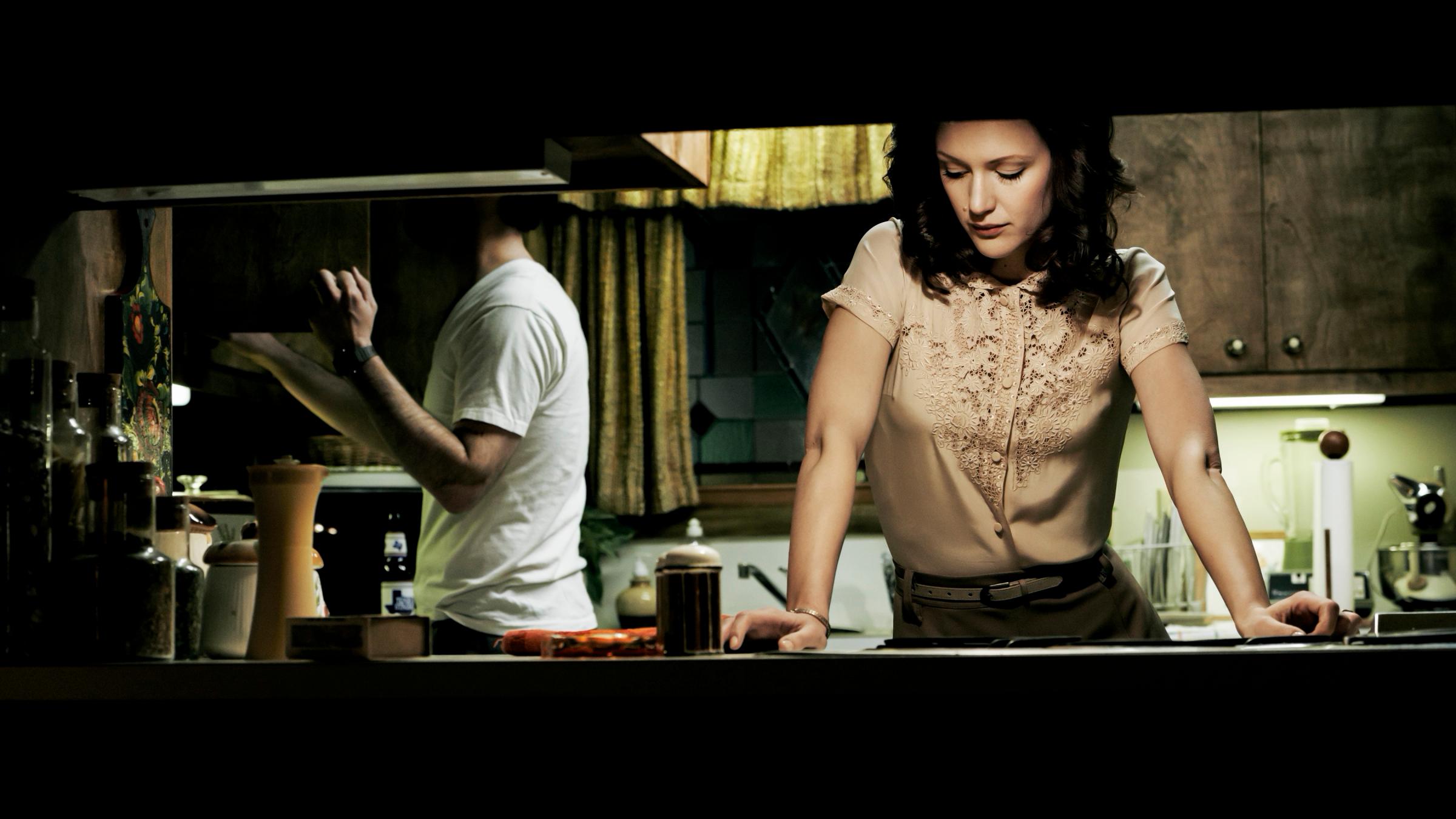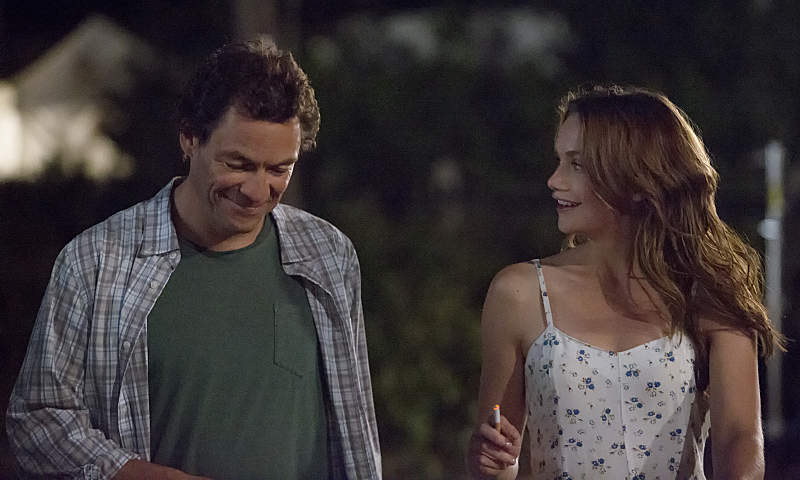
Manhattan, premiering Sunday night on WGN America, is about a point in history when the balance of power in war tilted from brawn to brains. In 1943, millions of soldiers were fighting and dying around the world, fighting on ships and in the air and in close combat in a global war. Yet the outcome of WWII–and the global dynamic for decades to come–would be determined largely by scientists holed up in a secret government-run community in Los Alamos, N.M., racing to develop the atomic bomb.
WGN’s second new drama after the goofy spookshow Salem, Manhattan is a big improvement for the network–not an instant game-changer like Mad Men for AMC, but promising enough to make it worth finding out what channel WGN is on in your cable lineup. (Brooklyn Time Warner Cable customers, I just found it myself–it’s channel 126!)
Creator Sam Shaw (Masters of Sex) and director Thomas Schlamme (The West Wing) have made a mature, thoughtful drama that explores how the pressure of the A-bomb race combines with military and professional politics to create workplace drama with stakes that are (literally) explosive. John Benjamin Hickey–whom you may know as The Good Wife‘s ChumHum chief–is especially striking as Frank Winter, a head researcher driven not just by patriotic urgency but fierce personal pride. (The Manhattan Project scientists were racing not just Hitler but other U.S. atomic scientists, competing with them for resources and glory.) The first two episodes build slowly, but there’s the stuff of a compelling drama about scientists and their families, exiled to what amounts to the nation’s most remote, highest-stress research campus. (“Harvard with sand,” one character jokes.)
But what’s most interesting about Manhattan at the get-go is how it’s another example of how, in TV as in WWII, brains may be starting to supersede brawn, at least a little. That is: several series this summer and fall are investing in the radical idea that there can be drama in things other than people getting horribly killed.
The last season of The Good Wife featured a running gag about a parodically grim cable drama that Alicia Florrick watched in which brooding cops did terrible things and gave even more terrible speeches about the nature of evil. (It was, basically, Low Winter Sun, veiled with Saran Wrap.) The joke was maybe a little self-serving–a (justified) complaint that lesser dramas got more credit and praise than the fantastic Good Wife because they were on cable and relentlessly bleak and violent. But it also pointed out the fact that in the Breaking Bad / Game of Thrones / Walking Dead era, it had become almost a requirement that serious new TV dramas had to be physically brutal, that their dramatic stakes had to be pointy.
The first half of 2014 brought more crime-and-violence-driven shows willing to take up Heisenberg’s black hat. And it was fine: True Detective gave us a murder case as Southern Gothic existentialism class, Fargo kept winter coming with its distinctive dark comedy. But it didn’t do much to change the impression that, these days, all TV drama flows out of the barrel of a gun.

But this summer and fall, new (and relatively new) dramas are striving to give Alicia some alternative viewing choices. Besides Manhattan, Showtime’s Masters of Sex–currently better than ever in its second season–draws its dramatic thrust (ahem) not just from eroticism but from the emotional and intellectual charge of scientific discovery: it’s about how research gives its characters’ lives purpose, and how their findings about sexuality and its myths have the potential to change the way their patients live. HBO’s The Leftovers deals with a global cataclysm’s emotional toll, not its body count. Debuting in August, Cinemax’s The Knick (from director Steven Soderbergh) explores fledgling surgical science in the New York City of 1900; Showtime’s The Affair–the best drama pilot I’ve yet seen for fall–is about the aftermath of infidelity. (And that’s not even considering channels like ABC Family, which has a number of entries in the not-murdering-people genre.)
I’ve loved a lot of bloody, brutal shows, but you get tired of so much red meat. Which is one reason why I’ve stuck with AMC’s Halt and Catch Fire, about the computer business in the early 1980s, for all its imperfections. The show has been knocked as a kludgy Mad Men clone, and with some reason: Lee Pace’s angsty Don Draper-esque man of mystery, is maybe the show’s fifth most interesting character. But the ensemble surrounding him are people you don’t see every day: in particular, the complicated marriage between programmers Donna (the terrific Kerry Bishé) and Gordon (Scoot McNairy) is a nuanced exploration of entrepreneurial dreams smashing into reality. It’s become a good show–not nearly a great one, but one that’s refreshing for showing that the simple drive to create a thing of your own can power a story.

It’s not as if these shows have taken a vow of pacifism. There’s a dramatic act of violence in the early episodes of Manhattan (and in a larger sense, of course, the show is about the eventual killing of far more people than Walter White ever took out). The Knick is extremely gory, but it’s medical gore, in a story about the bloody trial and error of an emerging science. The Leftovers incidents of violence are sparing, but they’re shocking. WeTV’s The Divide, a social-minded death-penalty drama, is rooted in a murder, albeit one dealt with as past history. Starz’s time-traveling Outlander, premiering in August, involves some hearty Scottish violence, but it’s secondary to the sci-fi-romance, culture-clash storyline.
It may be that TV audiences don’t want an alternative to violent franchises at all: see the healthy ratings for Fargo and The Strain. But if you’ve been hoping that TV drama’s subject matter could become as diverse as it’s become ambitious, the latter half of this year is looking promising. Big murder and mayhem premises will never stop being the stuff of many, many dramas. But as the Manhattan Project taught us, it’s also possible to harness incredible power from teensy, tiny things.
More Must-Reads from TIME
- Cybersecurity Experts Are Sounding the Alarm on DOGE
- Meet the 2025 Women of the Year
- The Harsh Truth About Disability Inclusion
- Why Do More Young Adults Have Cancer?
- Colman Domingo Leads With Radical Love
- How to Get Better at Doing Things Alone
- Michelle Zauner Stares Down the Darkness
Contact us at letters@time.com